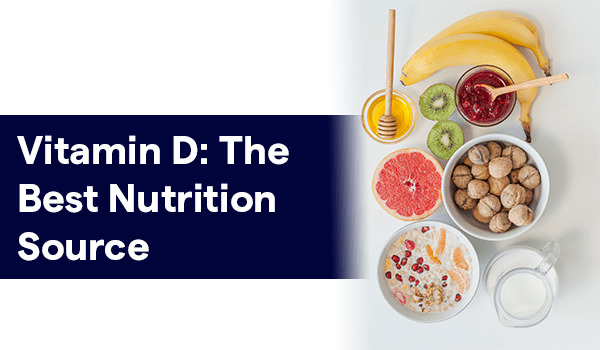
It has other vital roles in the human body as well. It helps reduce inflammation and is involved in processes such as cell growth and immune function. This means that vitamin D is not only necessary for bone health but also plays a part in maintaining optimal overall health. Although the best natural source of vitamin D is sunlight, the following foods also contain this vital ingredient.
|
Food |
Quantity |
Unit |
|
Cod liver oil |
1 |
tablespoon |
|
Mushrooms, white, raw, sliced, exposed to UV light |
1 |
cup |
|
Milk, 2%, |
1 |
cup |
|
almond, dry roasted |
1 |
ounces |
|
Ready-to-eat cereal 10% of the DV for vitamin D |
1 |
serving |
|
Egg, 1 large, scrambled |
1 |
large |
|
Cheese, cheddar |
1.5 |
ounces |
|
Mushrooms, portabella, raw, diced |
0.5 |
cup |
|
Chicken breast, roasted |
3 |
ounces |
|
Broccoli, raw, chopped |
0.5 |
cup |
|
Carrots, raw, chopped |
0.5 |
cup |
|
Apple |
1 |
large |
|
Banana, large |
1 |
large |
|
Lentils, boiled |
0.5 |
cup |
|
Sunflower seeds, roasted |
0.5 |
cup |
(Source: National Institutes of Health)
The food items mentioned above can help you get enough vitamin D to support your overall body health. In addition to its role in bone health, vitamin D supports muscle, cell, and cardiovascular health. It boosts immune system function, reduces inflammation with illnesses like cancer and arthritis, and helps regulate blood pressure. Vitamin D has also been linked to weight loss and reduced risk of heart disease.
Vitamin D deficiency is prevalent in the winter, even in countries like India. Research indicates that over 70% of Indians lack vitamin D. If we break down this data by gender, the percentages would be much higher—79% of males and 75% of females have vitamin D deficiency.
Symptoms of vitamin D deficiency can vary. Some common ones include fatigue, poor sleep, bone pain, depression or feelings of sadness, hair loss, muscle weakness, loss of appetite, and increased susceptibility to infections.
The recommended daily intake for most adults is 600-800 International Units (IU) of vitamin D. While sunlight is the best source, it's important to note that the body's ability to produce vitamin D decreases with age. Therefore, focusing on other sources like food and supplements is essential to meet our body's requirements. The best time to get vitamin D is between 10 am and 12 pm when the sun's rays are strongest. Aim for around 15 minutes of sun exposure on the face, arms, and legs without sunscreen to help your body produce vitamin D. However, it's essential to strike a balance and protect your skin from excessive sun exposure, as extended exposure can lead to sunburn and increase the risk of skin cancer.
Take a proactive step towards maintaining your overall health by addressing vitamin D deficiency. The best orthopedic hospital in India, Sir Ganga Ram Hospital, urges you to prioritize your bone health, immune system function, and overall well-being.
To know more, book an appointment.